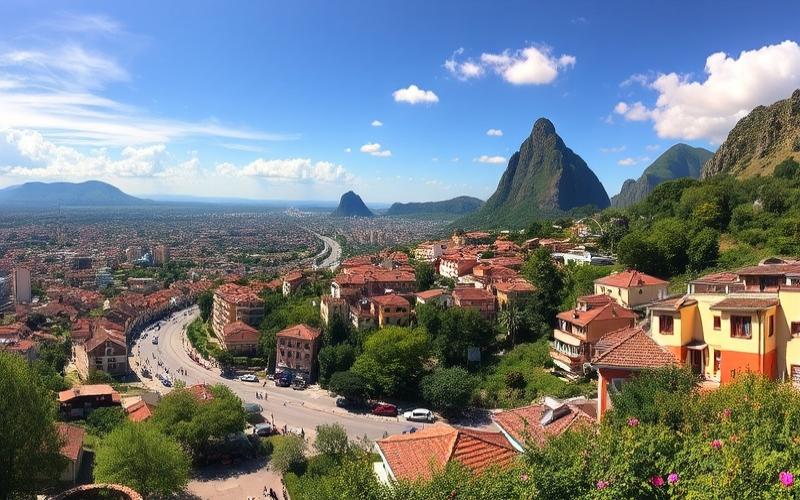
 Published on and written by Cyril Jarnias
Published on and written by Cyril Jarnias
In a context where the Brazilian real estate market presents both opportunities and challenges, auction platforms are emerging as key players in the sector. These digital tools are redefining traditional buying and selling methods, enabling both investors and individuals to access diverse properties with increased transparency.
The spectacular growth of these platforms reflects rapid adaptation to new technologies, offering unmatched accessibility and efficiency in the real estate acquisition process. In this article, we will explore how these innovations are transforming the Brazilian real estate landscape and examine the implications for all stakeholders.
Understanding Brazil’s Real Estate Auction Market
The Brazilian real estate auction market is experiencing dynamics driven by the recovery in residential demand, marked regional disparities, and a macroeconomic environment still constrained by inflation and high interest rates, which influence credit costs and transaction structures. The rise of online auction platforms is reshaping practices by expanding access, transparency, and liquidity, while imposing new compliance and risk management requirements.
Key Economic Drivers
- Inflation and contract indexing: rising IPCA, INCC-M, and IGP-M indices increase construction costs and rents, affecting valuation strategies and adjustment clauses in asset sales and acquisitions through auctions.
- Interest rates and credit: high rates reduce accessibility to traditional financing and channel some demand toward discounted acquisitions at auctions, particularly in distressed segments or those resulting from bank defaults.
- Robust residential demand: increased sales in São Paulo and rising price indices in several state capitals support the supply of assets put up for auction, including foreclosed properties and institutional portfolios.
- Regional and city segmentation: performance gaps between metropolitan areas and secondary markets are reflected in discounts observed at auctions and success rates based on location and asset quality.
Regional Differences and Asset Heterogeneity
- Major metropolitan areas (São Paulo, Rio): price stabilization or moderate growth, stronger competition for “prime” asset auctions, and shorter due diligence periods.
- Secondary cities (Curitiba, Belo Horizonte, Florianópolis): sustained traction with premiums linked to quality of life; auctions offer attractive entry points but with value dispersion.
- Tourist areas (coastal regions, premium destinations): recent strong appreciation resulting in smaller auction discounts for liquid properties, but more seasonal volatility.
- Logistics and rural markets: M&A activity and portfolio transactions indicate legal sophistication and demand for alternative real estate, with implications for land and special asset auctions.
Regulatory Framework and Local Practices
- Legal framework: auctions can occur through judicial proceedings (foreclosures, bankruptcies) or extrajudicially (banks, trusts), governed by civil law and specific procedures for advertising, appraisal, and adjudication, with frequent contract indexing to national indices.
- Guarantees and titles: legal security has been strengthened by the sophistication of recent real estate transactions, boosting investor confidence in adjudications, subject to rigorous verification of encumbrances and disputes.
- Local variations: appraisal practices, procedural timelines, and availability of registry documents vary by state and municipality, influencing auction schedules and operational risks.
Potential Benefits for Investors
- Acquisition discounts compared to the market, especially for distressed assets, judicial sales, or bank portfolios, enabling value capture through restructuring or repositioning.
- Broader access to asset classes (residential, logistics, rural) with standardized adjudication mechanisms and improving legal security.
- Regional diversification: opportunity to arbitrage between stable metropolitan areas and growing emerging markets.
Key Risks to Manage
- Legal and titling issues: real encumbrances, protected occupants, ongoing litigation, or post-adjudication challenges require thorough due diligence and assistance from local experts.
- Macro-financial factors: sensitivity to interest rates and inflation affecting carrying costs, refinancing, and rental profitability through indexing.
- Operational risks: heterogeneity in property quality, CAPEX requirements, and information disparities across regions; increased execution risks in judicial sales.
- Liquidity: longer resale periods outside dynamic hubs; price volatility across segments and cities.
Technological Innovations and Auction Transformation
Online Platforms
- Digitalization of catalogs, virtual tours, legal data rooms, and digital security deposits, reducing information asymmetries and transaction costs.
- Expansion of bidder base (national and international), improved offer transparency, timestamping, and adjudication traceability.
- Integration of analytics: price histories, indexing indices, and regional benchmarks to calibrate auction strategies and reserve prices, consistent with observed price dynamics.
Impact on Practices
- Accelerated sale and adjudication timelines, standardization of extrajudicial processes, and professionalization of institutional sellers (banks, funds).
- Convergence with dynamic secondary markets: cities with high sales growth see higher participation rates in online auctions, increasing price formation efficiency.
Practical Points to Consider When Participating in Auctions
- Verify occupancy status, charges (IPTU, condominium fees), and existence of disputes or easements.
- Model interest rate and inflation scenarios for rental flows and resale, considering local contract indexing.
- Adjust strategies by region:
- Metropolitan areas: stronger competition, focus on intrinsic quality and liquidity.
- Secondary/tourist cities: analyze cyclicality and net yields after CAPEX.
- Rely on professionals (lawyers, registrars, engineers) to secure property transfer and anticipate procedural timelines.
Table — Key Factors and Implications for Auctions
| Factor | Current Status | Implication for Auctions |
|---|---|---|
| Inflation and Indexing (IPCA, INCC-M, IGP-M) | Cost pressures and contract adjustments | Recalibration of reserve prices and expected returns |
| Interest Rates | High levels, more expensive credit | Opportunities for discounted assets; higher carrying costs |
| Residential Demand | Rising sales, price increases in several cities | More institutional and judicial supply; better adjudication liquidity |
| Regional Disparities | Stable metropolitan areas, growing secondary cities, rising tourist zones | Differentiated auction strategies by location |
| Legal Security | Increased transaction sophistication | Enhanced confidence, essential due diligence |
| Digitalization | Online platforms, data and transparency | Expanded access, reduced costs, faster execution |
Good to Know:
The Brazilian real estate auction market, influenced by economic factors such as fluctuating interest rates and strong urbanization, shows notable regional disparities, with more dynamic activity in major cities like São Paulo and Rio de Janeiro. Local regulations, although harmonized at the national level, can vary in terms of procedures and costs, impacting investors who must navigate between opportunities and risks such as price volatility or title issues. Online platforms are expanding rapidly, offering unprecedented transparency and facilitating auction access even for international investors. These digital innovations are reshaping the auction landscape, enabling broader participation and reduced timelines compared to traditional auctions, although investors must remain vigilant about sometimes incomplete information available online.
Advantages and Risks of Buying at Auction in Brazil
Real estate auctions in Brazil can offer potentially below-market purchase prices, a wide variety of properties (bank assets, estates, judicial seizures), and unique opportunities difficult to find in the traditional market. They may also come with tax benefits depending on investment structuring (e.g., use of local holding companies or depreciation schemes) and sometimes flexible payment conditions set in the auction specifications.
Main Advantages
Major Risks
Examples and Order of Magnitude
Precautions to Minimize Risks
Pre-Bid Verifications (Due Diligence)
Financing and Timeline Management
Local Support and Compliance
| Aspect | Key Advantage | Risk/Cost | Recommended Action |
|---|---|---|---|
| Price | Potential 15-30% discount vs market | Discount reduced with strong competition | Set strict maximum price and include fees |
| Diversity | Access to atypical/unlisted properties | Occupancy, renovations, hidden defects | Enhanced technical/legal due diligence |
| Payment | Sometimes flexible modalities | Immediate deposit, short deadlines, no withdrawal | Secure financing before auction |
| Taxation | Possible optimization through structures | Local complexity | Local tax advice and ex-ante simulation |
| Fees | — | 7-15% adjudication fees | Precise budgeting in IRR/ROI |
| Procedure | Fast process | Over/under bidding, specific local rules | Exhaustive reading of specifications |
For Brazil, inform yourself about: procedures (judicial/extrajudicial auctions), responsibilities for prior debts (IPTU, condominium), occupancy and eviction rules, timelines and appeal routes, and applicable taxation for non-residents. Always have the file validated by a local lawyer before bidding.
Good to Know:
Buying property at auction in Brazil offers the advantage of accessing prices often below the traditional market, a diverse range of properties, and the possibility of discovering unique opportunities. Auctions can also provide tax benefits and flexible payment conditions, which may appeal to investors. However, risks include lack of transparency about property conditions, potential legal disputes, and the need for quick and substantial payments. It is crucial to conduct thorough verifications to avoid unpleasant surprises, such as visiting properties beforehand and researching local laws. For example, a recent study showed that 30% of auctioned properties had undisclosed hidden defects, highlighting the importance of due diligence. Buyers must also understand the specifics of the Brazilian auction system to avoid unexpected issues.
Strategies for Finding Good Deals in Judicial Sales
Opportunities in Brazilian judicial real estate sales are found by combining targeted monitoring of major auction platforms, rigorous legal due diligence, and financial/technical preparation enabling competitive bids while controlling risks.
Main Online Auction Platforms Used for Judicial Sales
- Judicial auctions via specialized marketplaces operated by official auctioneers (licensed appraisers), often integrated with state courts; verify the auctioneer’s accreditation, official URL, and court notice publication before participating.
- Real estate portals and local firms may relay links to judicial auctions; always cross-reference with the court notice and competent registry office to confirm authenticity.
Identifying Relevant Listings and Filtering Opportunities
- Define objective criteria: location, discount vs. market, property type, occupancy status, fees and property release timelines, rehabilitation costs.
- Set up alerts on auction portals and verify consistency between listing, court notice, and property registry extract (matrícula).
In-Depth Research (Due Diligence) Before Auction
- Obtain updated matrícula from the Property Registry Office to confirm ownership, charges, mortgages, usufructs, seizures (penhoras) or registered disputes.
- Verify permits, construction history, and urban compliance, as purchasing irregular property exposes buyers to fines and demolition if illegality is confirmed.
- Examine sale notice: payment conditions, auctioneer commission, signing deadlines, responsibility for condominium or IPTU debts, viewing rules, and possession/vacation modalities.
- Assess occupant status (tenants, foreclosed owner, squatters) and necessary procedures (eviction action, possession claim), with impacts on timelines and costs.
Preparing Competitive Bids
- Set maximum price including: required discount compared to market value, legal costs, potential arrears (condominium, taxes), rehabilitation, auctioneer fees, and registration costs.
- Pre-establish liquidity and fund traceability (account in Brazil, foreign investment registration if applicable) to meet strict post-adjudication payment deadlines.
- Define bidding strategy: bid increments, withdrawal threshold, and use of automatic bidding if available, while respecting limits set by the notice.
Legitimacy Verification and Fraud Prevention
- Confirm auction is published by an official auctioneer and referenced by the competent court (cross-consultation between platform, notice, and State Court of Justice website).
- Never transfer funds outside channels indicated in the notice; verify bank details and account name corresponding to official instructions.
- Check essential documents: recent matrícula, charge certificates, proof of judicial publication, and data consistency between notice and registry.
Tools and Resources for Estimating Value and Costs
Market Value Assessment
- Recent sales comparables by neighborhood, local broker analyses, and technical visits when authorized.
- Consultation of matrícula and cadastral data to verify areas and legal characteristics (impact on valuation).
Anticipating Renovation/Repair Costs
- Technical inspection (when possible) and cost estimation of common issues; include contingency for unforeseen expenses based on property condition and age.
- Verification of urban compliance and permits to avoid regularization costs or penalties.
Professional Collaboration
- Engage a lawyer specialized in Brazilian real estate to secure due diligence (titles, charges, disputes, compliance) and drafting/validation of post-adjudication documents.
- Prepare banking and tax aspects: fund traceability, foreign investment registration when applicable, and declarative obligations related to capital gains and local taxes.
Summary Table of Key Control Points
| Critical Element | What to Verify | Why It’s Essential |
|---|---|---|
| Matrícula (registry) | Owner, descriptions, charges, seizures | Avoids purchasing encumbered or disputed property |
| Auction Notice | Conditions, deadlines, commissions, assumed debts | Legal and financial framework of sale |
| Occupancy Status | Type of occupant, eviction timelines/procedures | Impact on possession and costs |
| Urban Compliance | Permits, necessary regularizations | Risk of fines/demolition if irregular |
| Payment Capacity | Funds, traceability, schedule | Compliance with strict post-auction deadlines |
Practical Action List Before Bidding
- Obtain updated matrícula and all charge certificates.
- Read entire notice and confirm legitimacy on court website.
- Establish budget including visible and hidden costs, with safety margin.
- Open/organize accounts and flows for quick and traceable payment.
- Conduct visit or, if impossible, detailed documentary/technical assessment.
- Set maximum price and disciplined bidding strategy.
To succeed in a Brazilian judicial sale, combine rigorous selection, exhaustive legal due diligence, operational financial preparation, and formal validation of auction legitimacy. This combination transforms apparent discounts into truly secured opportunities.
Good to Know:
To find good deals in Brazilian judicial real estate sales, thorough preparation and research are crucial. Use popular online platforms like “Leilões Judiciais” or “Superbid” to spot opportunities, but ensure you verify each property’s legal history by assessing its legal status and that of its occupants. Tools like “ZAP Imóveis” can help evaluate property values to formulate competitive bids. Research should include estimating potential renovation costs, often necessary after purchase. Beware of fraudulent auctions by verifying sale legitimacy through reliable resources or consulting local experts.
How to Effectively Participate in a Brazilian Real Estate Auction
To effectively participate in a Brazilian real estate auction, start by verifying legal prerequisites: under Brazilian law, property ownership only transfers upon registration of the deed with the Property Registry (Registro de Imóveis), in accordance with the Civil Code and the Public Records Law; registration constitutes the property right. The general framework applicable to real estate transactions is primarily defined by the Brazilian Civil Code (Law 10.406/2002) and supplemented by state and municipal local norms, requiring verification of specific rules in the property’s region.
Legal Prerequisites and Common Documents
Study Brazilian Online Auction Platform Regulations
Analyze Characteristics of Properties for Sale
Preliminary Research to Avoid Bad Investments
Budget and Bidding Discipline
Identifying Best Offers and Spotting Competitive Auctions
Importance of Observing First
Role of Professionals
Summary Table of Key Steps and Control Points
| Step | Main Action | Legal/Technical Point to Verify |
|---|---|---|
| Registration | Create account, accept regulations | Local conditions and platform requirements |
| Pre-qualification | Deposit/escrow, identification documents | Proof and powers of attorney, KYC compliance |
| Due Diligence | Titles, debts, occupancy, urban planning | Authenticity and property registry registration |
| Market Analysis | Comparables, rents, returns | Municipal/state variations |
| Bidding Strategy | Maximum price, bid increments | Overbidding rules and deadlines |
| Adjudication | Payments and fees | Authentic deed and notarial formalities |
| Registration | Constitutive right at Property Registry | Effective property transfer |
Good to Know:
To effectively participate in a Brazilian real estate auction, it’s essential to comply with legal prerequisites, including registering with the responsible entity and providing documents such as identification and proof of residence. It’s crucial to study specific online platform regulations, as these can vary considerably. It’s also recommended to research the local real estate market and carefully examine characteristics of properties for sale to assess opportunities and avoid bad investments. Establishing a clear budget and sticking to it is vital to avoid overbidding. First attending a few auctions as an observer can provide valuable insight into the process. Advice from a real estate agent or specialized consultant can also be very helpful in navigating the complex auction system and identifying the best offers.
Disclaimer: The information provided on this website is for informational purposes only and does not constitute financial, legal, or professional advice. We encourage you to consult qualified experts before making any investment, real estate, or expatriation decisions. Although we strive to maintain up-to-date and accurate information, we do not guarantee the completeness, accuracy, or timeliness of the proposed content. As investment and expatriation involve risks, we disclaim any liability for potential losses or damages arising from the use of this site. Your use of this site confirms your acceptance of these terms and your understanding of the associated risks.






















































